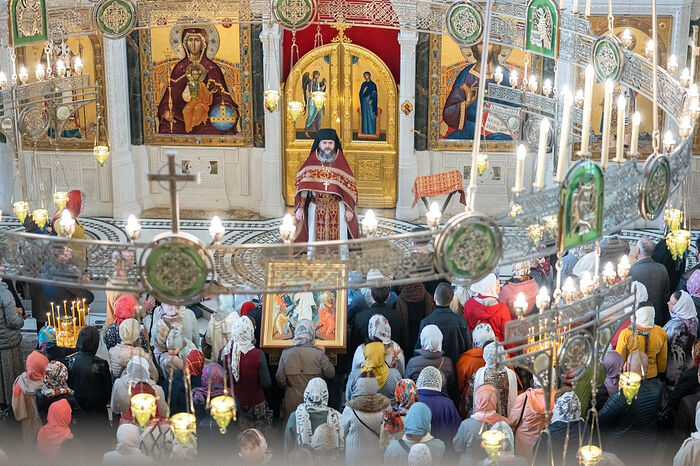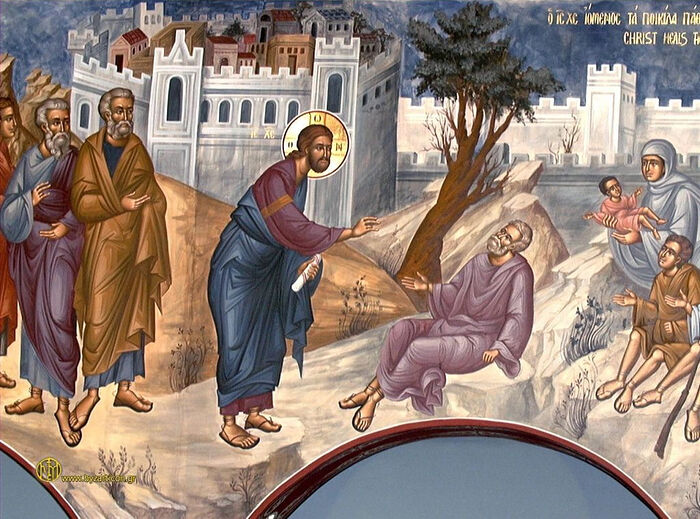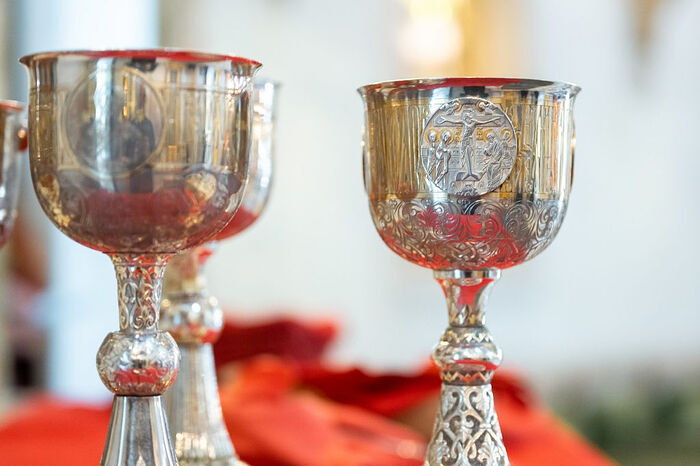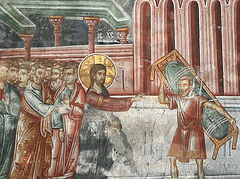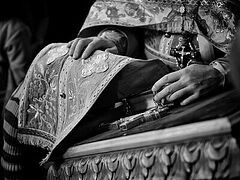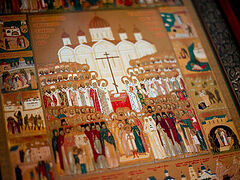In the name of the Father, the Son, and the Holy Spirit!
Today’s Gospel story, as always, directly relates to the life of every Christian. Every time we hear the Gospel reading, we apply everything that happens there, all of Christ’s words, to ourselves, to our own lives. In this is the mystery of the Gospel. And every time we hear this, we are as if hearing it for the first time, as if anew, and we are even amazed. We think, “How could this be? It seems to me I’ve read or heard this passage forty times already, and every time it sounds like something new and important for our lives.”
Today we heard this famous story about how Christ healed a man who had lain thirty-eight years by the font and had no possibility to be healed. Christ saw this man at the Sheep’s pool, and learned from him who he is and why he lay there. The man didn’t even complain, but simply told him that he had no man who would lower him into the pool so that we might be healed, and others go in before him. The miracle that happens every year passes this man by.
The Lord healed this paralytic, who had no hope of salvation. Of course, in this event we see that Christ is capable of healing all our sins, all our paralysis and sickness. Only He is the true doctor, before Whom the laws of this world are nothing. He is higher than these laws. So, this very Christ, Who healed this man, later meets him in the temple because Christ had departed right after the healing, and told him these important words: “Do not do what you did again”—do not sin. You have been healed, but do not sin again, so that something even more serious and bitter would not happen to you. It’s just like what all the ordinary people we know, even unbelievers, our friends and family, often say to us. Truly, there exists such an immutable law. People forget it, regardless of whether they believe in it or not. And it’s true that we cannot endlessly tempt the Lord. His love is boundless, but there are limits after all. For, that same man who was healed by Christ heard these words. That is, Christ Who heals us, Who was crucified for us, Who came to this world and Who resurrected, Who commanded us to drink His Blood and eat His Body—that same Christ says to us, “Sin no more, lest a worse thing befall you.” These were words of warning, and they were not pronounced lightly. And we are convinced each time that this law acts immutably in this world. Yes, perhaps not right away. Yes, perhaps not every time; but if a person disdains God’s love and mercy, if he blasphemes God with his behavior, his life, if he does not appreciate that Christ came and was crucified for his salvation, then inescapable retribution awaits him. We often simply do not connect these things; however, every humble-minded person sees and understands what is happening to himself and others. But decades pass, and he says, “Yes, I did that after the Lord gave me the opportunity to correct myself, to live honestly—but I started sinning again, and this is the result.” It often happens that something goes wrong with the children, or with family, or the business. He thinks, “I sinned there, but no one saw it”, and then his life begins to fall apart from another angle. These words that the Lord says are very important; they relate very directly to our life today.
It’s not only that we, of course, are all paralyzed and we recall this every time the Sunday of the Paralytic comes around, but that we all too often start sinning again and doing terrible things, forgetting that the Lord warned us—the very Lord Who loves us, Who heals us. He warns: “Don’t do that, because it will be worse for you.”
Today we are experiencing a wave of trials and events that are changing the life we are used to; that way of life, which has existed for probably the last fifteen to twenty years, has suddenly been shaken. It’s all falling apart, and we continue to hope that it will now all pass and everything will be like it was before. No, it won’t be like it was before. It will be completely different. And the Lord, Who does not abandon us, knocks each time at the door of our heart and calls us to repentance and correction. We understand this, but we tell ourselves: “Yes, the Lord wants us to be different, but we want to live just like we lived before,” and then the Lord begins to knock at our hearts not with just a gust of wind; there are thunder and gales. Then they start knocking at our windows with clubs so that we would wake up and understand that we cannot go on tempting the Lord, and we can’t do those things we’re used to doing. And we cannot allow such things to go on in our Fatherland.
Do you remember that sickness we had not long ago? And now it’s not important what it really was—it was in any case a sickness that swept over our entire society. If it had not happened, then priests would not have died in such numbers—and many really did die. So the Lord sent us such a trial. But what did we say and hear? We said that we need to repent, we need to change, we need to become different people—real humans, saints. Or we talked about how to avoid one thing or another through various means. What settled into our hearts? Fear settled into the many people’s hearts over those couple of years; people stopped receiving Communion. There are people who had been taking Communion for decades, and then you look—that person isn’t here. You meet him on the boulevard and say, “What happened? It’s all over now, you can start receiving again.” And there are many such people.
Well, we might think that perhaps the Lord sent us one trial, but we didn’t understand it, we didn’t hear it, we didn’t change, or say to ourselves, “Lord, that happened to us for this or that reason.” We simply waited for them to tell us, “Well, you can receive again”; and now the Lord is sending us trials again that are even heavier. Again priests are dying, again churches are being destroyed, and again people are filled with anxiety because blood is being spilled. Perhaps it is because we did not understand that we must not do the things we are used to doing. A feathered man must not dance on the Cross!1 It is forbidden. Such things should not be! This is unacceptable in Holy Russia! The Lord may take all of us severely to task for this. He will say: “I healed you, I suffered for your sake on the Cross, I spilled My blood for your sake, I give you my Body and Blood for food—and you allow such blasphemy.” And what might the consequences be? What trials might come? Now many people, spiritually gifted people, see, and they connect one thing with the other—these events of war. People say that it first began with blasphemy—they sawed down crosses there, blasphemed here, destroyed the Church there and simply mocked it. And wise pastors say just that when they are asked: “Whose fault is it?” People want to hear: “This or that party is guilty.” But those wise men say, “We are all guilty, because we allowed all that to go on.” Therefore, dear brothers and sisters, today’s Gospel reading should be a reminder to us that everything we do can have very serious consequences, because the Lord said that to the healed paralytic: “Sin no more, lest some worse thing befall you.” The Body and Blood of Christ is a great blessing; it is a mystery, it is an inheritance that no one else has. And the Cross of the Lord is the greatest spiritual treasure. We should remember this always and never allow our lives, our sins to offend Christ, lest something worse befall us. Amen.

